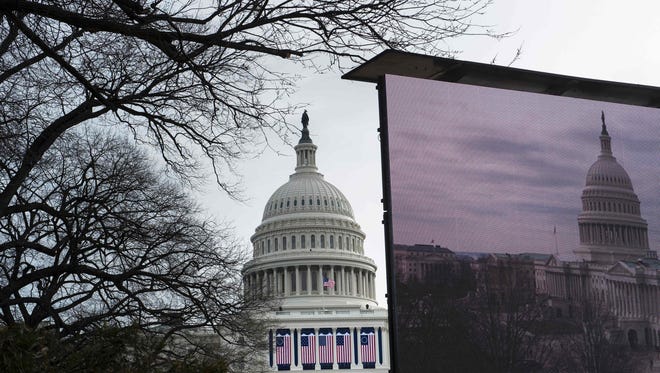Why senators didn't join Trump inauguration boycott: Ross K. Baker
For one thing, many see themselves exactly as a potential future president.

Twenty-five years ago, I wrote a book entitled House and Senate that laid out the differences between the two chambers of our national legislature. I wrote it because I believed that Americans tend to conflate the two chambers. This is, in part, because of the widespread use of the shorthand term "Congress" to apply to anything or anybody connected with the U.S. Capitol. The experience of writing the book led me to appreciate more acutely differences both substantial and trivial that set the two apart.
I also came away with an admiration for the United States Senate. Accordingly, I was not surprised when no senators announced that they were boycotting the inauguration of President-elect Donald Trump.
The first and most obvious difference between the two chambers is, of course, is how different in size the two houses are. It is more than a quantitative difference. The two differ in quality. It didn't surprise me when a reported more than 60 House members — all Democrats — announced that they would be boycotting the inauguration of Trump, or that no senators have announced a decision to join them. Being part of a smaller chamber gives senators, rightly or wrongly, a sense of being something special. Each senator has, in a sense, a larger ownership share of the chamber than his or her House counterpart.
Trump is our president: Jonathan Turley
The smaller chamber promotes a kind of intimacy that mitigates personal antagonism even in the face of record-high evidence of polarization on votes. I have always been amazed at the cordial feelings that transcend party lines, from Democratic leader Chuck Schumer kibitzing with GOP whip John Cornyn in the Senate gym to former Democratic leader Harry Reid's admiration for Republican colleagues such as Richard Shelby and Rand Paul.
Democrats own the D.C. swamp: Ross K. Baker
Feuds in the House are easy to conduct and can persist for a long time. With 435 voting members, the House enables you to easily dodge a colleague with whom you've clashed. In the Senate, there is no place to hide. Senators serve on committees that are much smaller than their House counterparts. After all, the Senate has to legislate in the same policy areas as the House with less than a quarter of its membership.
The two chambers even vote differently. The House uses an electronic system that allows members to briskly insert a card into a slot to register an aye or nay and leave; senators need to respond to roll calls in person and often hang around in the chamber until the vote is tallied. This provides opportunities for interactions among senators, often across party lines.
POLICING THE USA: A look at race, justice, media
Trump has Congress if he can keep it: Michael Medved
But it is the difference in the constituencies that they represent that exerts perhaps the greatest influence on a senator's decision to attend or stay away from the inauguration. Every senator represents an entire state composed of substantial numbers of Democrats and Republicans; House districts can be lopsidedly partisan because of the way people sort themselves out or because of gerrymandering. In some districts, a single ethnic group predominates. This is especially the case with districts set aside to maximize minority representation. So Rep. Donald Payne from New Jersey's 10th Congressional District, centered on the city of Newark, can thumb his nose at Trump with no political risk. Sen. Cory Booker represents the entire state of New Jersey, including a substantial number of constituents who voted for Trump. It would needlessly antagonize Republican constituents to blow off the inauguration.
It should also be noted that senators are known to harbor presidential aspirations, and showing up at the inauguration of a chief executive, even one of the opposing party, is more "presidential." Constitutionally, moreover, the Senate is more closely tied to the presidency because of its role in confirming Cabinet nominees and ratifying treaties that presidents have negotiated.
Ultimately, perhaps, it is senators' self-regard that can often appear insufferable but also persuades them to avoid some of the more unattractive aspects of political pettiness. If that contributes, even in some small way, to the reconciliation of which this country is right now so needy, it is worthy of our recognition.
Ross K. Baker is a distinguished professor of political science at Rutgers University and a member of USA TODAY's Board of Contributors.
You can read diverse opinions from our Board of Contributors and other writers on the Opinion front page, on Twitter @USATOpinion and in our daily Opinion newsletter. To submit a letter, comment or column, check our submission guidelines.